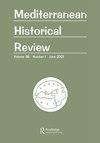The quest for certainty in early modern Europe: from inquisition to inquiry 1550–1700
IF 0.2
2区 历史学
Q1 HISTORY
引用次数: 0
Abstract
concepts like “union”, “progress”, “equality” and “freedom” is here compressed into a view of transnational linkages between coal mines. Across the longer sweep of the book’s eight chapters, such analytical choices result in a peculiar winnowing of the possibilities available to those who found reason to challenge coalonialism’s steep inequalities and structures of domination: either direct confrontations with the material conditions surrounding coal’s extraction and combustion or modes of critique emanating from the shifting currents of Islamic thought. In showing how fear of disaster could serve as “an ethical force directing man to the righteous path” (191) or how the shar’i designation of coal as rikaz or “buried treasure” could underwrite Ottoman uses of fossil wealth for charity (218), Barak’s nuanced excavation of Islamic knowledge production around coal technologies and their hazards in the book’s fifth and sixth chapters is clearly intended to unearth elements of a usable past. In the book’s moving conclusion, through a daring leap into the present, he makes explicit the sense of urgency attending this search for alternative lifeways and imaginaries that might inform the “painstaking political work” of decarbonizing the world (226). But such compelling arguments about the messy and complex entanglements of global carbonization are undercut by the markedly narrower criteria according to which specific actions, concepts and movements appear to “count” as part of that political work within the book itself. Even if, in places, Barak’s methodological commitments thus serve to obscure the full range of political forces and ideas that might be directed against the powers of fossil fuel, he has written a magnificent study that reveals the breath-taking magnitude and sweep of the struggles that remaking a world forged out of coal’s blazing flames will entail.近代早期欧洲对确定性的追求:从宗教裁判所到调查(1550-1700)
“联合”、“进步”、“平等”和“自由”等概念在这里被压缩成煤矿之间跨国联系的观点。在这本书的八章中,这样的分析选择导致了对那些找到理由挑战煤炭主义的严重不平等和统治结构的人的一种独特的可能性筛选:要么直接对抗煤炭开采和燃烧周围的物质条件,要么从伊斯兰思想的变化趋势中发出批评模式。巴拉克在书的第五章和第六章中细致入微地挖掘了伊斯兰教关于煤炭技术及其危害的知识生产,他的目的显然是要挖掘出可用的过去的元素。在书中,巴拉克展示了对灾难的恐惧如何成为“指引人类走向正义道路的道德力量”(191),以及伊斯兰教法将煤炭称为“rikaz”或“埋藏的宝藏”如何支持奥斯曼帝国将化石财富用于慈善事业。在书中动人的结尾,通过大胆的跃进到现在,他明确地表达了寻找替代生活方式和想象的紧迫感,这可能会为世界脱碳的“艰苦的政治工作”提供信息(226)。但是,这些关于全球碳化的混乱和复杂纠缠的令人信服的论点被明显更狭隘的标准所削弱,根据这些标准,具体的行动,概念和运动似乎“算作”书中本身政治工作的一部分。即使在某些地方,巴拉克的方法论承诺掩盖了可能反对化石燃料的政治力量和思想的全部范围,但他写了一篇精彩的研究,揭示了重建一个由煤炭燃烧的火焰打造的世界所需要的惊人的规模和广泛的斗争。
本文章由计算机程序翻译,如有差异,请以英文原文为准。
求助全文
约1分钟内获得全文
求助全文

 求助内容:
求助内容: 应助结果提醒方式:
应助结果提醒方式:


